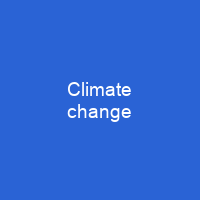Understanding the Urgency of Climate Change
Climate change isn’t just a distant threat—it’s happening now, and its impacts are profound. Imagine the Earth as a delicate balance, with human activities tipping that scale towards disaster. The rise in global temperatures due to fossil fuel burning is not only warming our planet but also altering weather patterns, leading to more frequent heatwaves, storms, and droughts. These changes aren’t just abstract—they’re real, affecting every corner of the globe.
The Human Impact
Climate change isn’t just about melting ice caps; it’s a direct threat to human health and well-being. How many times have you heard that climate change will lead to more extreme weather events? Well, it’s not just a prediction—it’s a reality. Flooding, heatwaves, and severe storms are becoming more common, putting millions of lives at risk.
The World Health Organization (WHO) has identified climate change as one of the biggest threats to global health in the 21st century. Can you imagine a world where extreme weather events lead to widespread illness and death? This isn’t just a future scenario—it’s happening now, with millions already affected.
The Role of Renewable Energy
Renewable energy sources like wind, solar, and hydro power are key in the fight against climate change. These clean energy solutions can replace fossil fuels for powering transportation, heating buildings, and running industrial processes. By transitioning to renewable energy, we not only reduce our carbon footprint but also create a more sustainable future.
Carbon capture and storage (CCS) technologies could play a critical role in reducing emissions, but they come with their own set of challenges. Enhancing natural carbon sinks through practices like reforestation can help, but it’s crucial to approach these solutions with caution and thorough planning.
The Urgency of Action
Limiting global warming requires far-reaching systemic changes in energy, land use, cities, transport, buildings, and industry. The United Nations Environment Programme estimates that countries need to triple their pledges under the Paris Agreement to limit global warming to 2°C. Achieving a 1.5°C target would require significant use of renewable energy and energy efficiency measures.
While the path forward is clear, it’s not without obstacles. Intermittent energy production, social concerns, and controversies surrounding nuclear power all pose challenges. However, the benefits of clean energy are undeniable—improving human health and reducing air pollution deaths can save lives and have significant economic benefits.
Adaptation vs Mitigation
While mitigation efforts aim to reduce greenhouse gas emissions, adaptation is necessary to address current climate change impacts. Adaptation measures include avoiding at-risk areas, learning to live with increased flooding, building flood controls, or managed retreat in the worst-case scenarios.
Economic barriers can hinder tackling heat impacts, but there are options like sustainable diets, diversification, erosion control, and genetic improvements that can help agriculture adapt. Insurance can also play a role in sharing climate risk, though it’s often unaffordable for low-income individuals.
Global Efforts and Policies
The 2015 Paris Agreement aims to keep global warming well below 2°C and contains an aspirational goal of keeping warming under 1.5°C. The agreement replaced the Kyoto Protocol, with countries required to regularly set ever more ambitious goals and reevaluate these goals every five years.
Other major pledges include the UK’s declaration of a climate emergency in 2019, the European Green Deal aiming for carbon neutrality by 2050, and similar commitments from South Korea, Japan, and China. These efforts highlight the global commitment to addressing climate change, but much more needs to be done.
Scientific Discoveries and Agreements
The early discoveries of scientists like Alexander von Humboldt and Joseph Fourier laid the groundwork for understanding the greenhouse effect and its effects on climate change. The 1987 Montreal Protocol has had benefits for both ozone depletion and climate change, as several ozone-depleting gases are powerful greenhouse gases.
As of 2019, over 99% agreement among scientists that humans cause warming and should take action. National science academies have called on world leaders to cut global emissions, with the IPCC’s latest report stating it’s ‘unequivocal’ climate change is caused by human activities.
Conclusion
The urgency of addressing climate change cannot be overstated. We are at a critical juncture where our actions today will shape the future for generations to come. By transitioning to renewable energy, implementing adaptation measures, and supporting global agreements like the Paris Accord, we can mitigate the worst impacts of climate change. The time to act is now—before it’s too late.
You want to know more about Climate change?
This page is based on the article Climate change published in Wikipedia (retrieved on March 4, 2025) and was automatically summarized using artificial intelligence.






